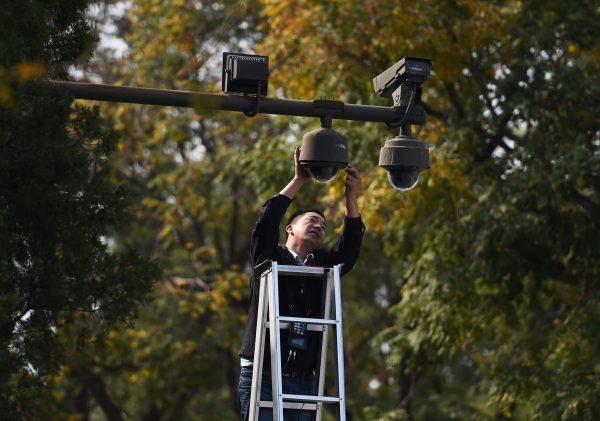WeChat is one of China’s most popular social media platforms, with 494.3 million individual users within China’s borders, at last count. For some, though, using it can be considered a crime.
Six practitioners of Falun Gong, a spiritual meditation discipline that is severely persecuted by the Chinese regime, were recently arrested and detained for posting messages on WeChat about the regime’s ongoing repression of the practice.
WeChat works closely with Chinese authorities to help censor content of which the regime disapproves. Information about Falun Gong, also known as Falun Dafa, is heavily censored within China. The spiritual practice, based on Buddhist and Daoist moral teachings, was banned in 1999.
Then-Chinese Communist Party leader Jiang Zemin feared the group’s popularity—in 1999, there were up to 100 million adherents, according to Western media outlets quoting Chinese officials—would undermine the Party’s authority. He launched a nationwide campaign in July 1999 to eradicate the practice, mobilizing the state’s security apparatus to arrest and detain practitioners, while state-run media spread hate propaganda to turn public opinion against adherents.

Falun Gong practitioners exercise in Beijing, before the persecution began on July 20, 1999. Courtesy of Minghui.org
More than 4,000 practitioners are confirmed to have died as a result of torture and abuse while in custody, although the real number is believed to be much higher, due to the difficulty of getting information out of China, according to the Falun Dafa Information Center, the group’s press office. In addition, large numbers of practitioners have been killed by means of forced organ harvesting in China’s state-sanctioned organ transplant business.
Despite the violent suppression, millions of Falun Gong practitioners continue to practice their faith, according to a 2017 report by human rights watchdog Freedom House on religious persecution in China.
Many try to disseminate information about the regime’s persecution to ordinary Chinese citizens, who are unable to access free information about Falun Gong on the internet or elsewhere within China’s borders.
This most recent case is the regime’s attempt to silence and punish these practitioners for their activity on WeChat. Four women and two men—Wang Hui, Wang Xin, Han Xiaoqiu, You Tingting, Wang Yong, and Wang Dengli—hailing from different cities and provinces, were arrested and subsequently detained at the Lishui City Detention Center in Zhejiang Province, according to Minghui.org, a U.S.-based website that tracks the persecution in China. Police, prosecutors, and Party agencies have since tried to coerce the six practitioners into giving up their beliefs, the Minghui report stated. They are scheduled for court hearings at Songyang County Court on March 20.
In the case of Wang Hui, plainclothes police pretended they were package deliverymen to lure her out of her home, then abducted her, in May 2017. She was brought to the local police station, then transferred to the Songyang County Detention Center. When family members and a lawyer visited the detention center to petition for Wang’s release, she was transferred to the Lishui detention center. Her family was not informed until 22 days later, according to Minghui.org.
China’s constitution guarantees freedom of religion, expression, assembly, and protest. But the reality is that, under the Party’s rule, Falun Gong practitioners and other dissidents continue to be arrested for simply practicing their faith or for spreading information.
The 2017 Freedom House report explained how Chinese authorities use surveillance technology and geolocation data to identify Falun Gong adherents, locate them, and gather “evidence” against them. “Court documents and anecdotes provided by Falun Gong refugees illustrate the varied and detailed types of evidence that authorities collect to convict adherents, from video footage on a bus to internet browsing histories and mobile phone records,” the report said.

A worker adjusts security cameras on the edge of Tiananmen Square in Beijing on Sept. 30, 2014. Greg Baker/AFP/Getty Images
Freedom House analyzed a sample of 59 court verdicts involving Falun Gong practitioners in 2016. All were sentenced to prison for accessing or posting information. “Their alleged ‘crimes’ included leaving voicemail recordings, posting messages to the social media platforms WeChat or QQ, using a virtual private network (VPN) to download content from Minghui, or simply possessing large numbers of leaflets or discs for apparent dissemination,” the report said.
Internet censorship grew increasingly severe during Party official Lu Wei’s time as head of the Cyberspace Affairs Administration. Lu was charged with corruption and stripped of his post and Party membership in February.
A number of Falun Gong adherents have been arrested and detained for internet posts about the Chinese regime’s persecution.
Forty-seven-year-old Huang Qian, for example, was arrested on Feb. 3, 2015, for posting a series titled “Gulag Memoir” on Weibo, the Chinese equivalent of Twitter, about the persecution. Huang was sentenced to five years in prison.
Zheng Jingxian, who also used Weibo as a platform to express his opinion, was arrested on the same day and detained at the Nanzhou Detention Center in the southern metropolis of Guangzhou.
Luo Qiong contributed to this report.





